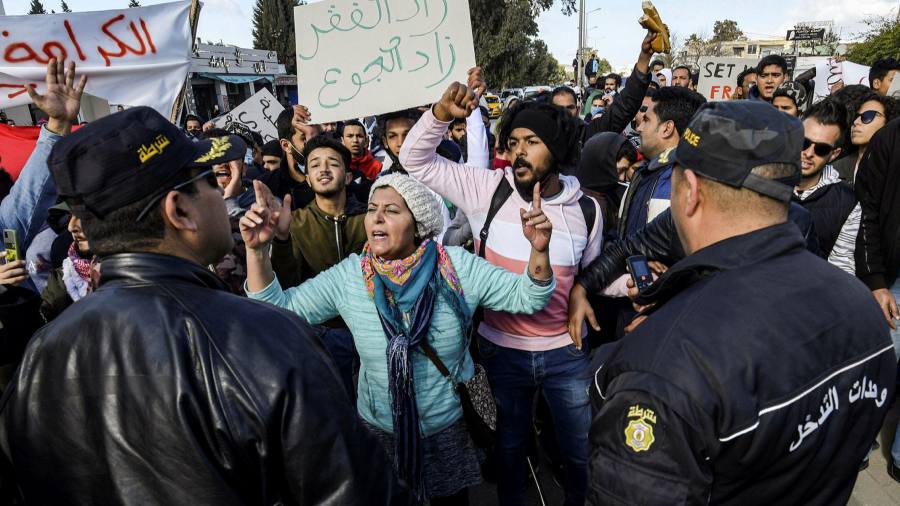[ad_1]
Tunisian lawmakers have approved a cabinet reshuffle that the government hopes will help turn the corner on a deepening economic crisis that has spurred disgruntled youths to take to the streets in the birthplace of the Arab uprisings.
Police held back demonstrators from parliament late on Tuesday as it approved 11 new ministers in charge of portfolios ranging from health to justice and the interior. Prime minister Hichem Mechichi hopes his new team will help steer the country as he implements difficult reforms amid a pandemic that has aggravated its already dire economic woes.
“Young people protesting outside parliament reminds us of our priorities,†Mr Mechichi told the assembly late on Tuesday, according to newswire reports.
Tunisia is regarded as the only example of a successful democratic transition among the Arab countries that rose up against dictatorship in 2011. Despite this status, the country has had more than 10 governments, all of which have failed to energise the economy and create jobs for young people who in 2020 faced unemployment levels of 36.5 per cent.
Popular anger has periodically boiled over into protests like those that swept the country earlier this month. Governments underpinned by weak coalitions in the fragmented parliament have been unable to push ahead with measures to speed up economic growth.
Tunisian officials have hinted they will borrow from the IMF, but that will require the implementation of tough reforms aimed at restoring balance to public finances by tackling energy subsidies, controlling civil service wage bills and stemming the haemorrhage of government funds to lossmaking public sector companies. The economy contracted 8.2 per cent in 2020 and the budget deficit widened to 11.5 per cent of gross domestic product.
Previous Tunisian governments have found it difficult to implement similar measures which have usually been met with resistance from the powerful Tunisian General Labour Union (UGTT) and from a despairing population which has seen its living standards plummet since 2011.
The challenge for Mr Mechichi, analysts say, will be securing broad-based acceptance for these reforms amid a fragmented parliament and under a president who competes with him for power and influence.
The ministers Mr Mechichi sacked were ones seen as appointees of Kais Saied, the elected president, analysts say. Mr Saied, who has limited constitutional powers restricted to defence and foreign affairs, has made no secret of his distaste for the party political system. A former professor of constitutional law, seen as a populist and political outsider, his election by a majority of more than 70 per cent in 2019 was seen as a rebuke to the country’s squabbling mainstream politicians.
“There is a kind of conflict of legitimacies between those two heads of executive power,†said Michael Ayari, analyst for the International Crisis Group, a conflict resolution think-tank. He added that political fighting had undermined the credibility of the political system in the eyes of many young Tunisians.
“The question is to what extent those parties that back Mr Mechichi will be able to continue to support [difficult reforms] and if he will be able to negotiate with the UGTT,†said Hamza Meddeb, analyst at the Carnegie Middle East Center. “There are already strikes in certain sectors to reject privatisation and attempts to heat up the situation. He will also have to find ways to neutralise the efforts of the president to wield a veto.â€
[ad_2]
Source link






